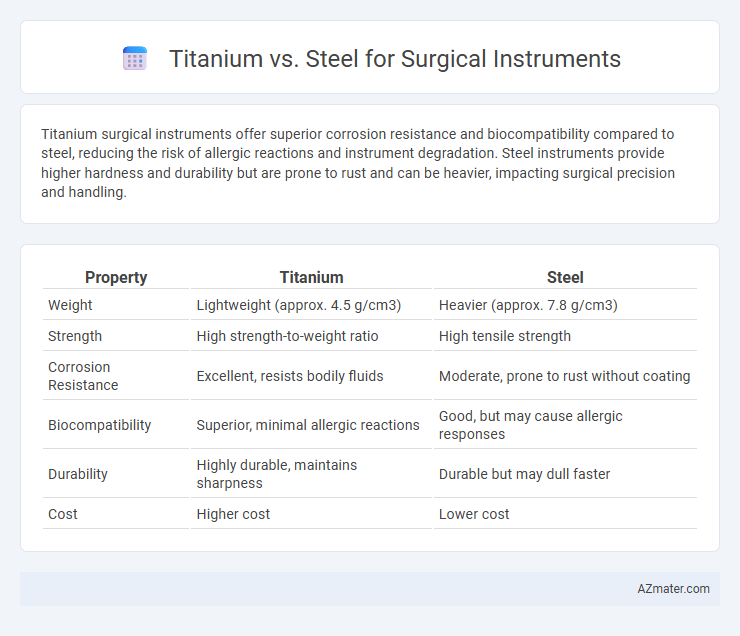Titanium surgical instruments offer superior corrosion resistance and biocompatibility compared to steel, reducing the risk of allergic reactions and instrument degradation. Steel instruments provide higher hardness and durability but are prone to rust and can be heavier, impacting surgical precision and handling.
Table of Comparison
| Property | Titanium | Steel |
|---|---|---|
| Weight | Lightweight (approx. 4.5 g/cm3) | Heavier (approx. 7.8 g/cm3) |
| Strength | High strength-to-weight ratio | High tensile strength |
| Corrosion Resistance | Excellent, resists bodily fluids | Moderate, prone to rust without coating |
| Biocompatibility | Superior, minimal allergic reactions | Good, but may cause allergic responses |
| Durability | Highly durable, maintains sharpness | Durable but may dull faster |
| Cost | Higher cost | Lower cost |
Introduction to Titanium and Steel in Surgical Instruments
Titanium and steel are the two primary materials used in surgical instruments due to their strength and durability. Titanium offers exceptional corrosion resistance, biocompatibility, and a lighter weight, making it ideal for delicate procedures and reducing surgeon fatigue. Steel, particularly stainless steel, provides superior hardness and edge retention, which is crucial for cutting instruments requiring sustained sharpness and mechanical strength.
Material Properties Overview
Titanium offers superior biocompatibility and corrosion resistance compared to steel, making it ideal for surgical instruments exposed to bodily fluids and sterilization processes. Its high strength-to-weight ratio provides enhanced durability while reducing instrument fatigue during long procedures. Steel, particularly stainless steel alloys, excels in hardness and edge retention but is heavier and more susceptible to corrosion without proper coatings or treatments.
Strength and Durability Comparison
Titanium surgical instruments offer superior strength-to-weight ratio compared to steel, providing enhanced durability while remaining significantly lighter for precise handling. Steel instruments, particularly those made from stainless steel alloys, exhibit exceptional hardness and resistance to wear, making them highly durable under repeated sterilization cycles. Titanium resists corrosion better than steel, maintaining structural integrity over time, although steel generally withstands impact and mechanical stress with slightly higher toughness.
Corrosion Resistance and Longevity
Titanium exhibits superior corrosion resistance compared to steel, making it highly resistant to bodily fluids and sterilization processes, which significantly enhances its durability in surgical applications. Its biocompatibility and lightweight properties contribute to long-lasting performance without the risk of rust or degradation, unlike surgical steel that can corrode over time under harsh conditions. Consequently, titanium instruments maintain structural integrity and sharpness longer, reducing the need for frequent replacement and ensuring consistent surgical precision.
Weight and Ergonomics
Titanium offers a significant advantage over steel in surgical instruments due to its lighter weight, reducing hand fatigue during prolonged procedures and enhancing precision. Its superior strength-to-weight ratio allows for ergonomic designs that improve maneuverability without compromising durability. Compared to steel, titanium instruments contribute to better surgeon comfort and efficiency by minimizing strain and facilitating smoother, more controlled movements.
Biocompatibility and Patient Safety
Titanium offers superior biocompatibility compared to steel, minimizing allergic reactions and corrosion risks in surgical instruments. Its non-ferromagnetic properties make titanium safer for use in MRI environments, reducing patient risk during imaging procedures. Steel, while durable and cost-effective, poses higher risks of metal ion release and allergic responses, impacting patient safety in sensitive cases.
Cost Considerations and Availability
Titanium surgical instruments typically have a higher upfront cost compared to steel due to the expensive manufacturing processes and material expenses involved. Steel instruments are more widely available and favored in budget-sensitive healthcare settings because of their lower price and abundance. Despite cost differences, the choice often balances durability, weight, and specific surgical needs with budget constraints and supply chain factors.
Performance in Surgical Applications
Titanium surgical instruments offer superior corrosion resistance and biocompatibility compared to steel, reducing the risk of allergic reactions and instrument degradation in sterile environments. Their high strength-to-weight ratio allows for precise handling and reduced surgeon fatigue during prolonged procedures. Steel instruments, while heavier, typically provide greater hardness and edge retention, making them ideal for cutting and suturing tasks that require durable, long-lasting blades.
Maintenance and Sterilization
Titanium surgical instruments offer superior corrosion resistance compared to steel, reducing maintenance frequency and prolonging tool lifespan. They withstand high-temperature autoclave sterilization without degradation, ensuring consistent performance during repeated cycles. Steel instruments require more frequent inspections and care to prevent rust and maintain precision after sterilization processes.
Choosing the Right Material for Surgical Instruments
Titanium offers superior corrosion resistance and biocompatibility compared to steel, making it ideal for surgical instruments requiring durability and patient safety. Steel, particularly stainless steel, provides excellent strength and cost-effectiveness, maintaining sharp edges and ease of sterilization in high-demand surgical environments. Selecting the right material depends on the specific procedure, balancing factors such as weight, corrosion resistance, strength, and budget constraints to ensure optimal instrument performance and longevity.

Infographic: Titanium vs Steel for Surgical Instrument
 azmater.com
azmater.com